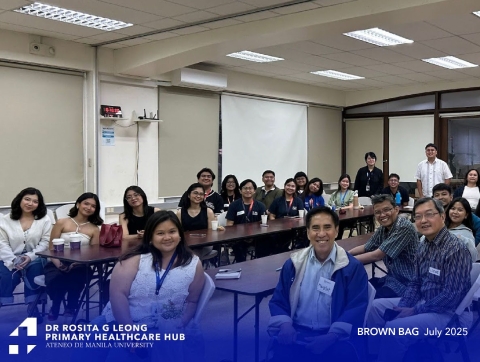CALL FOR APPLICATIONS: Deputy Chief of Party for Program Development and Management (Health Systems Strengthening Project)
17 Apr 2024
Terms of Reference
Position Title: Deputy Chief of Party for Program Development and Management (Health Systems Strengthening Project)
Location: Quezon City, Philippines
Description
The Ateneo School of Government is the public policy academic arm of Ateneo de Manila University. Its long-term mission is to teach and work with effective and ethical public servants to build prosperous, sustainable, just, and happy communities in the Philippines, empowered by democratic, participatory, transparent, and accountable governance institutions and processes. Through its research and extension programs, and its work with public, private and civil society organizations, ASOG aims to develop and foster innovative ideas and approaches in order to change mindsets and systems in such areas as leadership, poverty eradication, climate change, social accountability, and politics.
ASOG is expecting to implement a project that will support current efforts to realize the goals of Universal Healthcare with specific emphasis on strengthening the performance, sustainability, resilience, and responsiveness of the local and national health systems.
Tasks and Functions
The Deputy Chief of Party (DCOP) for Program Development and Management plays a critical role in supporting the Chief of Party (COP) in achieving the project's objectives. This position focuses on leading the design, implementation, monitoring, and evaluation of project activities to ensure efficient and effective delivery of high-quality programmatic outcomes.
The DCOP for Program Development and Management is expected to:
Program Development and Planning
- Work closely with the COP and other Deputy Chiefs of Party to develop a comprehensive project implementation plan, including activity schedules, budgets, and M&E frameworks;
- Lead the development of detailed work plans for each project component, ensuring alignment with the overall project strategy;
- Identify and analyze potential risks and develop mitigation strategies to ensure smooth project implementation; and
- Oversee the development of quality assurance and quality control procedures for project deliverables.
Program Implementation and Management
- Manage the day-to-day operations of the project, ensuring adherence to donor guidelines, best practices, and project timelines;
- Supervise and provide technical guidance to project staff responsible for implementing program activities;
- Facilitate communication and collaboration among project teams, technical experts, and consultants;
- Identify and address challenges that may arise during project implementation; and
- Oversee procurement processes to ensure timely acquisition of resources needed for project activities.
Monitoring, Evaluation, and Learning
- Work closely with the M&E specialist to develop and implement a robust monitoring and evaluation (M&E) system for project activities;
- Oversee the regular collection, analysis, and reporting of project data to monitor progress, identify bottlenecks, and inform decision-making; and
- Facilitate knowledge-sharing workshops and learning events to disseminate project findings and best practices among stakeholders.
Reporting
- Support the COP in preparing and submitting high-quality progress reports to the donor and other stakeholders, including quarterly, semi-annual, and final reports; and
- Ensure reports meet donor requirements and provide accurate and insightful information on project activities, progress, and achievements.
Qualifications
- Master's degree in public health, public policy, international development, or a related field;
- A minimum of 7-10 years of experience in program development, management, and implementation within the health sector;
- Demonstrated experience in leading and managing complex health programs, preferably in a similar context;
- Strong understanding of monitoring and evaluation principles and methodologies;
- Proven ability to manage budgets and resources effectively;
- Excellent communication, collaboration, and interpersonal skills; and
- Experience working in a team environment and providing technical guidance to staff.
Desired Competencies
The competencies listed below go beyond traditional public health competencies and emphasize social determinants of health and a systems approach, particularly grounded in localization. The more critical competencies are on execution and operations strategy, particularly in communication, conflict management, and building partnership relations with stakeholders. These are crucial for effectively implementing and managing the project, especially in a complex environment of multiple stakeholders, multilevel implementation, and complex environments like the healthcare sector. These skills can facilitate collaboration, mitigate challenges, and ensure smooth project implementation, ultimately contributing to the success of the initiative. Other competencies include:
- Project Management. Proven ability to manage complex health programs, including experience with activity scheduling, budgeting, resource allocation, and risk management.
- Monitoring and Evaluation (M&E). Strong understanding of M&E principles and methodologies, with the ability to design and implement robust M&E systems for program evaluation and data-driven decision-making.
- Public Health Knowledge. Familiarity with key public health issues and health systems strengthening approaches.
- Strategic Thinking. Ability to translate the overall project strategy into concrete, achievable work plans for individual project components.
- Team Leadership. Proven ability to motivate, guide, and provide technical direction to project teams and staff.
- Problem-Solving. Strong analytical and problem-solving skills to identify and address challenges that may arise during project implementation.
- Cultural Competency. Understanding of and sensitivity to the local context and cultural dynamics relevant to the project.
- Learning Orientation. Commitment to continuous learning and staying current with best practices in program development and management.
All interested applicants must submit the following:
- Curriculum Vitae
- An Application Letter addressed to Dr. Philip Arnold P. Tuaño, Dean of the Ateneo School of Government
Submit the required documents via email to policycenter.asog@ateneo.edu and use “[SURNAME] - DCOP for Program Management - Health Systems Strengthening Project” as email subject.
Deadline for the submission of applications is on 30 April 2024.





